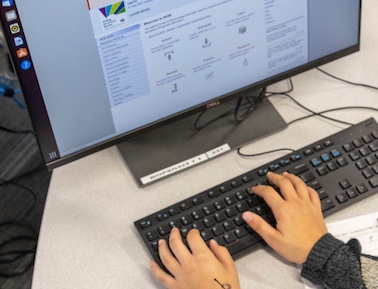Lab in focus: CEC Assistant Professors collaborate in Cybersecurity research

Assistant Professors Suman Bhunia and Khodakhast Bibak work in the Department of Computer Science and Software Engineering at Miami University. Bhunia joined the Miami faculty in July 2020 and Bibak joined the CEC faculty in Fall 2018.
“It was tough initially, not being able to see the students and adapting to this new teaching methodology right from the beginning, but with the university, and especially the College of Engineering, they made it very smooth,” Bhunia said when asked about joining the Miami faculty during the COVID-19 pandemic.
In their current research on cybersecurity, they are learning how to make complex systems safer against security attacks, as well as identifying and fixing past mistakes that have been made in building the cybersecurity systems.
Miami’s CEC is very proud of the work that their students do and always pushes them to improve. Bhunia and three Miami students are working with Dr. Arthur Carvalho of FSB and Dr. Liudmila Zavolokin of University of Zurich on a new project called MiamiCards, which is still in development at the moment.
Miami Cards is a card exchange for fans of Miami’s athletes where they can own trading cards of their favorite student athletes. Typically, trading cards are physical, but Bhunia, masters student Monu Chaudhary and undergraduate students Zach Katz and Sam Kuhbander are working on this project in a digital domain and are using a Non-Fungible Token (NFT) based system for these transactions that will make the process completely digital.
In the next phase of this project, they will be interviewing students to get their opinions on the cards. Next, they plan to submit a short paper called “Secure Neighbor Discovery in a Multi-TransceiverFree-Space-Optical Ad Hoc Network” and are considering a longer version for a journal paper as the research matures. A publication of Bhunia’s that was created with students has recently appeared as a Consumer Communications and Networking Conference (CCNC) conference paper that he completed with Jessica Vazquez-Estrada, Yicheng Qian, and Nero Tran Huu.
Additionally, Bibak gave a detailed description of his research with masters student Robbie Ritchie, a 2021 Miami graduate, on cybersecurity. He and Ritchie introduced a Deterministic Parallel Random-Number Generator (DPRNG) called DOTMIX-Pro and, using techniques from cryptography, showed that it can be significantly faster than the more well-known DOTMIX.
“We proposed efficient constructions for quantum key distribution (QKD). As part of this, we proposed certain message authentication codes (MACs) for use in QKD, which are fast, efficient with key material, and highly secure. In fact, these constructions are even more key-efficient than the most widely used authentication methods for QKD.” Bibak said.
They also designed new families of almost-delta universal hash functions which have better collision bounds than the better known Polynomial Hash. These constructions also provide everlasting security, so if authentication remains unbroken during the execution of QKD then the resulting keys retain information-theoretic security (ITS) and guarantees that the adversary cannot gain any information on the keys even with unlimited computational power as a result.
Four publications resulted from the research Ritchie and Bibak did on this subject. They appeared in several highly prestigious venues, including Quantum Information & Computation, Quantum Information Processing, Proceedings of the 2020 Data Compression Conference (DCC 2020) in Snowbird, Utah, and soon in The Journal of Supercomputing.
Alongside his research on cybersecurity, Bibak is interested in quantum computing. Quantum computers are machines that use quantum physics and store data in order to perform computations that are much faster than the average computer. With this additional research, he says that the use of quantum computers is a lot more efficient compared to the current techniques used in cybersecurity, so they are currently building more secure algorithms and systems even in the face of powerful quantum computers.
“I plan to continue working in these areas and add more things, for example, techniques from Artificial Intelligence (AI), as well as using techniques from cybersecurity in AI. The combination of cybersecurity, quantum computing, and AI techniques and the interaction between those would be really cool for me,” Bibak said when asked about future research.
Bibak and Bhunia have been an incredible team and help each other out a lot in their cybersecurity research. The professors have noticed the motivation of the students within and beyond the classroom since they’ve started at Miami and both said that students have been a large inspiration for their continued research on this topic.
CSE combines teaching and scholarship. The innovative works of faculty such as Dr. Bhunia and Dr. Bibak are also reflected in the wider effort to create a new Bachelor's Degree in Cybersecurity. The degree is projected to start in Fall 2023 and would include ten new courses in Cybersecurity which can prepare students for those careers in the future. According to the New York Times, there are currently 3.5 million open positions in cybersecurity as of August 2021, so the job market in this field is very in-demand.
Written by Gabby Benedict, CEC Reporter

